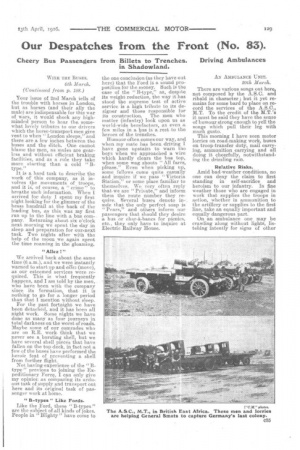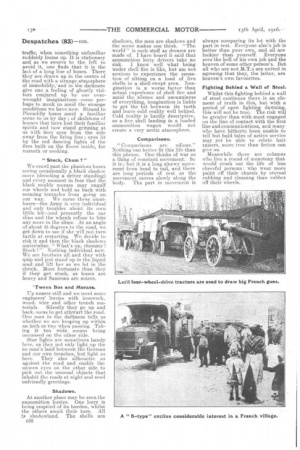Our Despatches from the Front (No. 83).
Page 7

Page 8

If you've noticed an error in this article please click here to report it so we can fix it.
Cheery Bus Passengers from Billets to Trenches. Driving Ambulances in Shadowland.
WITH THE BUSES.
6th March.
(Continued from p. 108.) Your issue of 2nd March tells of the trouble with horses in London, but as horses (and their ally the mule) are indispensable for this war of wars, it would shock any highminded person to hear thesomewhat lovely tributes to our drivers which the horse-transport men give vent to when "London sleeps," and there are a few inches between the buses and the ditch. One cannot blame the men, as mules are gearless and without efficient braking facilities, and as a rule they take more starting than a cold " B-type."
It is a hard task to describe the work of this company, as it involves the movements of troops, and it is, of course, a "crime" to breathe such information. When I arrived for duty I spent my first night looking for the glimmer of the brass handrail at the back of the leading bus, as this was my first run up to the line with a bus company. Returning about six o'clock next morning we spent the day in sleep and preparation for our.next task. Two nights after with the help of the moon we again spent the time roaming in the gloaming.
" Allez
We arrived back about the same time (6 a.m.), and we were instantly warned to start up and allez (move), as our esteemed services were required. This is what frequently happens, and I am told by the men, . who have been with the company since its formation, that it is nothing to go for a longer period than that I mention without sleep.
For the past fortnight we have been detached, and it has been all night work. Some nights We have done as many as four journeys in total darkness on the worst of roads. Maybe some of our comrades who are on R.E. workthink thatwe never see a bursting shell, but we have several shell pieces that have fallen on the top deck, in fact not a few-of the buses have performed the heroic feat of preventing a shell from further flight. Not having experience of the " Btype. " previous to joining the Expeditionary Force, I can only give my opinion as comparing its arduous task of supply and transport but here and its original task of passenger work at home.
" B-types " Like Fords.
Like the Ford, these " B-types " are the subject of all kinds of jokes. People in " Blighty " have come to the one conclusion (as they have out here) that the Ford i a sound proposition for the money. Such is the case of the " B-type," as, despite its weight reduction, the way it has stood the supreme test of active service is a high tribute to its designer and those responsible for its construction. The men who matter (infantry) look upon us as world-wide benefactors, as even a few miles in a bus is a rest to the heroes of the trenches.
Humour often comesour way, and when my mate has been driving I have gone upstairs to warn the boys when we approached a wire which hardly clears the bus top, when some wag shouts "All fares, please." Even when picking up, some. i
fellows -conic quite casually and quire f we pass "Victoria Station," or some place familiar to themselves. We very often reply thatwe are " Private," and inform them the route number they require. Several buses denote inside that the only perfect soap is "Pears," and others inform our passengers that should they desire a bus or char-h-bancs for picnics, etc., they only have to inquire at Electric Railway House. Au AMBULANCE UNIT.
20th March.
There are various songs out here, not composed by the A.S.C. and ribald in character; but it yet remains for some bard to place on record the services of the A.S.C., ALT. To the credit of the M.T.'s it must be said they have the sense of humour strong enough to yell the songs which pull their leg with much gusto.
This morning I have seen motor lorries on road-making work, buses on troop-transfer duty, mail carrying, ammunition carrying and all doing it cheerfully, notwithstanding the drizzling rain, Relative Risks.
Amid bad-weather conditions, no one can deny the claim to first standing in self-sacrifice and heroism to our infantry. In fine weather those who are engaged in work that supplies the troops in action, whether in ammunition to the artillery or supplies to the first line, take an equally important and equally dangerous part.
On an ambulance one may be crawling along without lights, ustelling intently for signs of other
traffic, when something unfamiliar suddenly looms up. It is stationary and as we swerve to the left to avoid it, one finds that it is the labt of a long line of buses. There they are drawn up in the centre of the road with a strange atmosphere of immobility, and in the darkness give one a feeling of ghostly visitors conjured up by our overwrought imaginations—come perhaps to mock us amid the strange conditions we have now. Strand to Piccadilly buses amid a familiar scene to us by day ; of skeletons of houses that have lost their familiar spirits and now stand grinning at us with fiery eyes from the side away from the firing line ; eyes lit by the red dancing lights of the fires built on the floors inside, for warmth or cooking.
"Stuck, Chum ?"
We crawl past the phantom buses seeing occasionally a black shadow move (denoting a driver standing) and every moment in fear that the black muddy morass may engulf our wheels and hold us back with seeming' tentacles from going on our way. We curse these omnibuses—the Army is very individual and only ti-oubles about its own little bit—and presently the car slips and the wheels refuse' to bite any more in the Shine. At an angle of about 45 degrees to the road, we get down to see if she will not turn turtle at restarting. We decide to risk it and then the black shadows materialize. " What's up, chummy? Stuck ? " Nothing individual now. We are brothers all and they with quip and jest stand up in the liquid mud and lift her as we let in the clutch. More fortunate than they if they get stuck, as buses are heavy and Samsons are scarce.
'Tween Bus and Morass.
.1.11p nearer still and we meet some engineers' lorries with ironwork, wood, wire and other trench materials. Silently they go up and back, soias to get athwart the road. One man in the daikness tells us whether we are keeping up within an inch or tw,o when passing. Taking it too wide means being morass.ed on the other side.
Star lights are sometimes handy here, as they not only light up the no man's land between the German and our own trenches, hut light us here. They also silhouette us against the road and enable the unseen eyes on the other side to rick out the unusual objects that inhabit the roads at night and send unfriendly greetings.
Shadows.
At another place may be seen the ammunition lorries. One lorry is being emptied of its burden, whilst the others await their turn. All shadowland. The shells are
shadows, the men are shadows and the scene makes one think. "The world" is such stuff as dreams are made of. I have heard it said that ammunition lorry drivers take no risk. I know well what being under shell fire is like, but am not anxious to experience the sensation of sitting on a load of live shells in a shell-swept area. Imagination is a worse factor than actual experience of shell fire and amid the silence and uncanniness of everything, imagination is liable to get the bit between its teeth and leave cold reality well behind. Cold reality is hardly descriptive, as a live shell landing in a loaded ammunition wagon would not. create a very arctic atmosphere.
Comparisons.
"Comparisons are odious." Nothing can better fit this life than this phrase. One thinks of war as a thing of constant movement. So it ; but it is a long sinewy movement from head to tail, and there are long periods of rest as the movement moves slowly along the body. The part in movement is
always comparing its lot with the part in rest. Everyone else's job is better than your own, and all are luckier than yourself. Everyone sees-the hell of his own job and the heaven of some other person's. But all who are not M.T.s are united in agreeing that they, the latter, are heaven's own favourites.
Fighting Behind a Wall of Steel.
Whilst this fighting behind Et wall of steel continues there is an element of truth in this, but with a period of open fighting dawning, this will not be true. The risk will be greater than with most engaged on the line of contact with the first line andcommunications, and many who have hitherto been unable to tell but bald tales of active service may yet be able to relate hair raisers, more true than fiction can give us.
Meanwhile there are columns who live a round of monotony that would crush out the life of less cheerful persons : who wear more paint off their chassis by eternal rubbing and cleaning than rubber off their wheels.






















